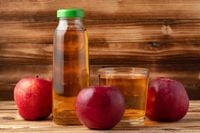S Martinelli & Company has issued a voluntary recall of 7,234 cases of its popular apple juice due to potential contamination with patulin, a toxic substance produced by molds that can grow on apples. This recall, which affects a total of 173,616 bottles, was initiated on March 18, 2025, and has been categorized by the U.S. Food and Drug Administration (FDA) as Class II, indicating that while the product may cause temporary or medically reversible adverse health consequences, it is not likely to result in serious health issues.
The recalled apple juice is packaged in 10-ounce bulbous glass bottles with a white metal screw top lid. Consumers should look for bottles with the Universal Product Code (UPC) 0 41244 04102 2 and a best-by date of December 5, 2026. The recall encompasses Martinelli’s apple juice distributed to 28 states, including Alabama, Arizona, Arkansas, California, Connecticut, Delaware, Florida, Georgia, Illinois, Indiana, Iowa, Kansas, Kentucky, Louisiana, Michigan, Mississippi, Missouri, New Hampshire, New Jersey, New York, North Carolina, Ohio, Pennsylvania, South Carolina, Texas, Utah, Virginia, and Wisconsin.
Patulin is a mycotoxin that can result from the presence of various molds such as Aspergillus, Penicillium, and Byssochlamys. These molds can thrive on rotting apples, and patulin is known to be resistant to heat and pasteurization, making it a persistent concern for apple juice manufacturers. The FDA has established a maximum limit of 50 micrograms per kilogram for patulin in apple juice products, a threshold that was set in 2005.
According to the FDA, patulin can cause immediate symptoms such as nausea, vomiting, and gastrointestinal distress. Furthermore, long-term exposure may lead to more serious health issues, including liver and kidney damage, immune system suppression, and potential DNA damage. "Consuming too much patulin can result in immediate symptoms such as nausea, vomiting, and various types of gastrointestinal distress," the FDA noted. This risk highlights the importance of manufacturers routinely testing their products to ensure patulin levels remain below the established limits.
At present, there have been no reported injuries linked to the consumption of the recalled apple juice. However, consumers are advised to check their products and dispose of any that fall within the recall parameters. It is crucial to properly discard any recalled products to prevent accidental consumption by others.
The Martinelli’s recall comes amidst a broader context of food safety alerts. Recently, the U.S. Department of Agriculture's Food Safety and Inspection Service (FSIS) issued a health alert regarding Cargill Meat Solutions’ pork carnitas due to potential contamination with foreign materials, specifically metal pieces. This alert, however, did not lead to a recall since the affected products were no longer available for sale.
Earlier this month, other food products also faced safety concerns. On April 10, 2025, a nationwide alert was issued for several popular soups, including those from Campbell’s, due to contamination of cilantro with wood. Additionally, Duda Farm Fresh Foods, Inc. announced a recall for its washed and ready-to-eat Marketside Celery Sticks sold at Walmart, which were potentially contaminated with listeria.
Consumers are reminded to stay vigilant about food recalls and to regularly check for updates from the FDA and other health authorities regarding food safety. The Martinelli’s recall underscores the need for awareness of food safety and the potential risks associated with consuming contaminated products.
In conclusion, while the recall of Martinelli’s apple juice may not pose a significant immediate threat, it serves as a reminder of the importance of food safety practices and the need for consumers to remain informed. Checking product labels and adhering to recall notices can help prevent health risks associated with contaminated food products.

